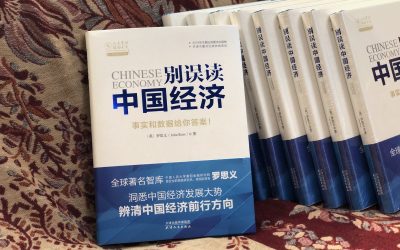It is too early to tell the effect on the result of the US Presidential election of Trump being infected with coronavirus. US opinion polls have shown for months Biden with a large lead over Trump and this increased slightly further following the first televised presidential debate. But what is clear is that while the outcome of the presidential election may make a significant difference to US tactics against China nevertheless whoever is elected president will continue an aggressive policy against China. Therefore, both China and the international community must prepare for this.

Trump is behind in the polls
A key starting point for analysing the situation following Trump’s illness is why he is behind in the polls and what were the results of the first TV debate between the US presidential candidates – in which Trump attempted to compensate for lagging behind Biden by savage personal attacks on the former Vice President?
All recent major US national opinion polls show Biden ahead of Trump with leads ranging from 3% to 13%. Furthermore, all major polls showed that following the TV debate there was a further shift in favour of Biden ranging between 6-13%. In short, Trump was already behind and the TV debate went badly for Trump.
Furthermore, it is well known that US presidential elections are decided in a few swing states. Polls in these showed that in the key state of Michigan Biden’s lead increased from 2% prior to the TV debate to 6% after it, and in the swing state of New Hampshire Biden’s lead widened from 4% prior to the TV debate to 8% after it.
Polls have been showing a persistent Biden lead since the spring. However, due to the undemocratic character of the US electoral system, which is biased in favour of Republicans in the electoral college which determines who is president, Biden will need to be approximately 3% ahead of the Trump in the popular vote to be sure of winning in the electoral college – Hillary Clinton beat Trump by 2.1% in the popular vote in 2016 but Trump still became president. Most polls, however, show Biden with at least this 3% lead in the popular vote necessary to win the presidency. The question is therefore whether anything connected with Trump’s illness can reverse this trend in support for the candidates? Why, therefore was Trump lagging in the polls when coronavirus struck him? The answer to this lies centrally in the implications of US relations with China.
Trump’s tactics to China
It is important to understand that Trump’s policies towards China represented a real change in US tactics, compared to previous US policies, but which had implications spreading into every field of foreign, and many areas of domestic, US policy. This sharp change in US tactics is why Trump becoming president unleashed such sharp political fight within the US ruling class and such a sharp polarisation in US society.
Obama’s presidency had already seen the establishment of the US ruling class view that confronting China was its most important foreign policy task – summarised in the famous ‘pivot to Asia.’ But Obama/Clinton/Biden’s calculation was that in a clash between the US by itself and China they could not be confident that the US would win. Therefore, the US had to a try to create a ‘broad anti-China’ alliance. Therefore:
- In the Pacific the anti-China Trans-Pacific Partnership (TPP) had to be created involving the US, Japan, Vietnam, Chile and other countries.
- The largest possible ally for Obama was in Europe and his foreign policy was therefore particularly focused on maintaining good relations with leaders there. In particular the closest possible partnership had to be created with Germany – Obama’s most important international political ally was Germany’s Chancellor Merkel. As the EU was vital for Germany, Obama pursued a policy of supporting the EU. As Germany and France wanted an anti-Russia policy, as Russia is the most powerful non-EU state in Europe, Obama/Clinton pursued a hostile policy to Russia.
- Relations with Europe overlapped with those in the Middle East – as for the EU economic relations with Iran were important. This was therefore a key factor behind the US-Iran nuclear agreement – the Joint Comprehensive Plan of Action (JCPOA). This was negotiated against the opposition of Israel.
- European states were also concerned with climate change, and there was an understanding of the importance of climate change in the Obama administration, and therefore the US negotiated the Paris Climate change accord. This was also one area where the US was prepared to cooperate within China.
- Domestically, within the US, a ‘reformist’ economic/social policy, aimed at giving at least some benefits to the poorest sections of the US population was pursued – symbolised by the extension of health insurance to a far larger section of the US population in ‘Obamacare’. As the African American, that is the Black, population of the US is the poorest this reformist policy aided them.
These international and domestic policies, which involved a ‘broad anti-China alliance’, twice secured the election of Obama. Hillary Clinton was the intended candidate for president to continue this Obama policy – and indeed she did gain the highest percentage of the popular vote in 2016 but was denied the presidency by the undemocratic nature of the US electoral system.
Trump changed US policy
Trump, and the sections of the US ruling class he represented, however disagreed with this Obama/Clinton/Biden strategy. Trump’s key supporters were in favour of an anti-China policy but analysed different tactics were required for it.
- These sections of the US capital supporting Trump believed that too many economic concessions were made to countries such as Japan and Vietnam to draw them into a broad anti-China alliance – these sections of US capital therefore opposed the TPP. Furthermore, they believed Japan, South Korea etc should transfer resources to the US through increased payment for US military protection etc.
- Sections of US capital supporting Trump also believed that the EU was a powerful economic rival to the US and therefore, instead of supporting it, the US should seek to weaken the European Union. Germany in particularly should be treated as a rival, made to pay more for US military protection etc. Britain should consequently also be encouraged to leave the EU.
- US support of the anti-Russia policy of the EU drove Russia closer to China, and therefore instead it was proposed that a pro-Russia policy should be pursued to attempt to drive a wedge between Russia and China.
- In the Middle East, these same forces were closer to Israel, and hostile to the EU, and therefore wanted to break the US-Iran nuclear deal, to support official recognition of Jerusalem as the capital of Israel etc.
- Oil interests were a core component of this section of the US ruling class and these opposed environmental regulations, the Paris Climate Change Accords etc.
- In summary, forces supporting Trump believed that instead of the US making concessions to other countries to create a broad anti-China alliance these other countries should transfer resources to the US so that the US could be in a stronger position to directly attack China – via means such as tariffs, measures against Huawei, TikTok etc
- To strengthen US capital in this confrontation with China there should be major cuts in taxation for US corporations and the rich which should be paid for by withdrawing health insurance from tens of millions of Americans (the drive to repeal Obamacare), ending a policy of support the poorest sections of US society who were Black Americans etc.
In summary Trump’s policy was an aggressive attack on numerous countries abroad, above all China, and an attack on the poorest sections of the US population.
This policy naturally created many enemies for Trump both internationally and domestically. But Trump calculated that he and this policy would be able to maintain its power in the US through utilising the white racism historically created by US imperialism. Consequently, non-white sections of the population both in the US and internationally were to be drastically attacked and demonised – initially Black Americans and Muslims to which were then added Chinese as the anti-China policy was stepped up. Trump’s attempt to blame the catastrophic failure of the US to control coronavirus on China, with claims about the ‘China virus’, was just the logical culmination of Trump’s entire racist orientation.
Spring explosion in the US derails Trump
For a prolonged period, it appeared that Trump’s international orientation, focused on attacks on China orientation, and sustained by racism within the US, would be sufficient to maintain Trump in office. Until the beginning of 2020 most analysts assumed that Trump would win the forthcoming Presidential election. But this situation was changed by two closely interrelated factors – the US disastrous US response to coronavirus, which logically followed from Trump’s strategy, and the huge explosion of the US Black community, supported by other sections of US society, in May 2020.
Trump’s reaction to coronavirus was merely a continuation of his previous policies. For Trump, every other issue was to be subordinated to attempting to strengthen US capital. Consequently, at all costs the US economy was to be kept open, and generating profit, whatever the human costs. Therefore, no protection was to be given to the population by lockdowns or other measure to control the virus. Any US state or city leaders who pursued such measures were immediately attacked by Trump. Those advocating wearing masks or other protective measures, which also symbolised how serious the virus threat was, were to be ridiculed. These policies inevitably struck the poorest Americans most severely, particularly Black Americans. But as such social groups were already not to be protected by Trump’s policies no attention was to be paid to their suffering. Simultaneously the huge death toll that resulted from these policies was to be blamed on China – thereby adding anti-Chinese racism to anti Black and anti-Muslim racism and xenophobia.
Internationally Trump undoubtedly had significant successes with his overall policy since his election. Mexico and Canada were successfully forced into an anti-China United States-Mexico-Canada agreement to replace the old North America Free Trade agreement. Huawei was forced out of Britain’s and Australia’s 5G network. The US largely paralysed the World Trade organisation etc.
But what Trump had radically miscalculated was the domestic situation in the US. The Black population of the US did not lie down and accept the further massive attack on them around coronavirus. Instead, the racist killing of George Floyd in Minneapolis on 25 May was the spark which ignited the largest political demonstrations in the entire history of the United States – up to 25 million Americans participated in these.
It is crucial that the situation with the Black community in the US is understood accurately. There are 40 million Black Americans – those of African American heritage. That is about 13% of the population. But the weight of the Black population in US politics is considerably greater than this.
First tactically, since 2008 the voting, or lack of voting, of the Black American population determined the outcome of US presidential elections. In 2008 and 2012 a massive turnout by Black voters delivered victory to Obama, and in 2016 a failure to turn out in large numbers to support Hillary Clinton led to her defeat. Whether the Black American population turn out in large numbers to vote for Biden in 2020 will almost certainly determine the outcome of this year’s presidential election.
Second, because they are the least privileged section of the population, Black American political movements have always been the most radical in the US and also the most supportive of progressive trends internationally. The Civil Rights movement in the US was closely tied to other countries internationally, there was significant support for China among leaders of the Black population during the period of Mao Zedong, the leaders of the Black US population were overwhelmingly against the Vietnam War etc.
Sometimes this greater radicalism of the US Black population is overwhelmed by the white racism of US society – whether this is the case in any situation is determined by the overall international and domestic relations of forces. But because coronavirus involved such a huge attack on such wide layers of US society this year the US Black population did not confront a united front of the US ruling class and a majority for white racists – Trump had nothing to offer to most of the white population who suffered both massive deaths from coronavirus (over 200,000 at the time of writing) and huge unemployment. Consequently 74% of Americans said they supported the protests carried out across the country following the killing of George Floyd.
Some Chinese media commentators have said that these huge US protests did not form a political party, were not socialist etc. This is true but it misses the point that the enormous demonstrations following the murder of George Floyd deeply shook US society and politics. In size they were even bigger than the protests against the US war in Vietnam – although the political crisis at the time of the Vietnam war was even deeper as at that time US military forces were disorganised by their defeat. But nevertheless, the events in Spring 2020 were the deepest crisis in the US since the Vietnam war. It is the result of this that changed the situation from one where the re-election of Trump was almost guaranteed to one where he was seriously behind in the polls.
Trump’s racist assault, in short, radically miscalculated the domestic situation within the US, led to a huge social explosion, and may have cost him the presidential election. Additional sections of the US ruling class considered that Trump was an ‘adventurist’ who had created too many enemies internationally and domestically and therefore he had to be removed from office.
What are the conclusions for China?
What are the conclusions that can be noted regarding this for China? Some may estimate that the fact that Trump is ill may attract a ‘sympathy’ vote which will allow him to overcome his lag in the polls and secure re-election. Another view is that Trump’s obvious incompetence in allowing the coronavirus to spread massively in the US, even to the point of affecting the highest circles of US politics, will discredit him. This remains to be seen. But in reality, elections are decided by more profound social processes than these. Trump will either be re-elected or defeated according to the struggle between the two different social blocs in the US which were analysed above.
China, in any case, neither interferes in the internal affairs of the US nor, even if it broke with that policy, does it have the practical ability to determine the outcome of such a profound social process as a US presidential election (those who think ‘Russian interference’ determined the outcome of the 2016 presidential election are living in a fantasy world!) The significant question for China is how it should respond to processes in the US which it cannot control.
China has responded to Trump’s attack on China by drawing profound strategic conclusions which are brought together in the concept of economic ‘dual circulation’ – within which emphasis is given to domestic circulation which is complemented by external circulation. Clearly such a policy is correct if Trump wins the election as his present policies will continue. But does this strategic concept need to be altered because Biden may now win the election?
The answer is No. A Biden presidency would, undoubtedly, lead to significant changes in US tactics in some aspects of its foreign policy. Some of these Biden has already been announced in advance.
But the area where there will be no change in strategic policy, although there may be changes in tactics, is towards China. Biden has been careful not to spell out his position on most of the anti-China economic measures introduced by Trump – tariffs, attacks on Huawei and TikTok etc. But this reflects the reality that these issues are peripheral to the concerns of the US electorate – Trump’s attempt to make the US electorate obsessed with relations with China has failed as they chiefly consider their problems are within the US. But the fundamental alignment of social forces behind Biden, as already analysed, represents an anti-China policy just as much as Trump and merely supports different tactics to achieve it.
Naturally, any change in tactics by Biden towards China must be analysed objectively. Biden almost certainly does consider climate change is dangerous to the US, as well as other countries, and there may be scope for collaboration with China on this – the only part of Biden’s announced policies which are seriously progressive are on climate change. There may be side effects of other Biden policies, such as return to the US-Iran nuclear agreement, or better relations with the EU, which can be utilised by China. But overall Biden intends to maintain the anti-China orientation of US policy. In that situation China’s ‘dual circulation’ – with the emphasis given to domestic circulation complemented by external circulation remains the correct strategic formula. Fortunately, the huge scale of China’s economy allows it to maintain such a policy.
The analysis given by China therefore remains the correct one whatever the outcome of the US presidential election – and regardless of the immediate sensation created by Trump contracting coronavirus. US media, in a typical self-obsessed way, has attempted to dramatize the situation by presenting the entire world as being obsessed by the outcome of Trump’s illness. The New York Times declared: ‘The news of an American president contracting a potentially lethal virus left the world shaken.’ But in reality, regarding China nothing fundamental was changed. China has already worked out its strategic response to US aggression – whether the US uses the tactics of Trump or the tactics of Biden. Of course, whether Trump or Biden becomes president will affect some tactics, and China’s foreign policy has already shown it will maximise any opportunities to improve relations.
But the overall aggressive attitude of the US to China, whether using the tactics of Trump or the tactics of Biden/Obama/Clinton, will strategically dominate the next period. As even the most crazed US neo-con circles do not advocate an actual war with China this competition will be played out primarily on the economic field. In that framework ‘dual circulation’ provides the correct framework – whatever the outcome of Trump’s illness and of the US presidential election.
* * *
This article originally appeared in Chinese at Guancha.cn.







Excellent analysis of American aggression and strategic response of China. “Dual circulation” will keep China strong to contain American aggression.